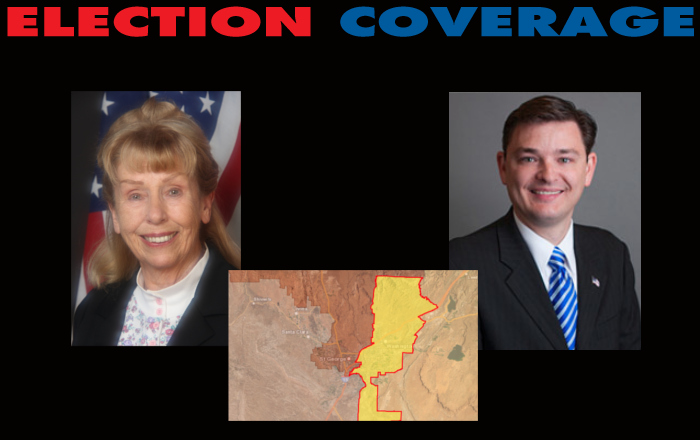
Written by Paul D. Dail and Brent Bonner
As Election Day looms less than a week away, candidates for the Utah State House of Representatives District 62—encompassing Washington City and portions of St. George to the east and south of I-15—are making final pushes to get their message out to the voters.
Jon Stanard is the Republican incumbent. A long-time entrepreneur and business owner in southern Utah, Stanard has started several local companies and been involved in civic activities benefiting schools, nonprofits, and local businesses. He is married and has three children.
Running for the Democratic Party is Shirley Nelson. Now retired, Nelson was a former chief of the Aircrew Training Systems and Vehicle Transportation Divisions, and terminal manager for the Department of Defense at Hill Air Force Base. She is a widow with two sons and five grandchildren.
Candidate priorities
If re-elected, Stanard said that while he opposes expansion of Medicaid as proposed by the Affordable Care Act, his most pressing concern is the inequality of health care in Utah. He believes that a safety net is necessary for health care for the elderly and disabled, and believes the current system of subsidies needs to be examined. While children are covered, he said, childless adults are out of luck.
“If they get up to 100 percent of [the] poverty level, they’ll get a federal subsidy on the exchange, and they get health care,” Stanard said. “But if they’re below 100 percent, they get zero. That’s backwards.”
Nelson said that she sees environmental reform and clean air and water issues as her main priorities for Utah, stating that without those reforms, nothing else matters, including economic development. Nelson spent 37 years living on the Wasatch Front, and said she believes the air quality problems evident in northern Utah are finding their way south.
“The state legislature has done nothing to control the major polluters in the state … I believe we need people in the legislature who will enforce rules and regulations, and pass laws to ensure that we know where the pollution is coming from, how much of it there is and how much it is changing our environment,” she said.
Anti-discrimination legislation
Last year, a bill proposed by Utah Sen. Steve Urquhart, which would make it illegal to evict or fire someone based on sexual orientation or gender identity, was shelved while the State of Utah appealed to the U.S. Supreme Court regarding the legality of Utah State Constitution Amendment 3, defining marriage. After the Supreme Court refused to hear the case, effectively legalizing same-sex marriage in Utah, Urquhart resubmitted his bill. District 62 candidates stand on opposing sides of this issue.
On Nelson’s website, “equal rights” is listed as her second priority, including such issues as raising the minimum wage and wage equality for men and women. She supports Urquhart’s proposed legislation.
“I believe in equal rights under the law for all citizens of the United States,” Nelson said. “No one group has the right to deny another group those rights. This is America, not Putin’s Russia.”
Stanard said he isn’t willing to commit to the bill without seeing more detail on the legislation; however, he said that his feeling is that he would most likely not support it. He cited examples in other states with similar issues, as well as his own experience as a member of the Business and Labor Committee in the state legislature. Stanard said that the sort of anti-discrimination law that Urquhart is proposing can be problematic.
“It’s very tricky to enforce, and questionable as to what good it does,” he said.
Gov. Herbert’s Healthy Utah Plan
After Utah rejected the portion of the Affordable Care Act which provided for Medicaid expansion, Gov. Gary Herbert began negotiations with the federal government for an alternative. In February, he introduced his Healthy Utah Plan, which would use money intended to expand Medicaid to instead provide state-funded subsidies to low-income residents who don’t currently qualify for Medicaid, so they can buy their own health insurance.
Stanard compared Herbert’s Healthy Utah Plan to the Affordable Care Act and said that he struggles to see what distinguishes Herbert’s plan from the president’s plan, which the vast majority of the Utah legislature did not support.
“I would love to hear more details,” Stanard said. “The governor says he is coming up with some very big differences, and I hope he can.”
Nelson, a supporter of the Affordable Care Act, said that she believed it was a shame when the legislature failed to pass Medicaid expansion in the state, claiming that Utahns are now paying federal taxes to support Medicaid expansion in other states. As for the Healthy Utah Plan, she called it “better than nothing at all,” but maintained that “he could have got the same result by accepting the Medicaid expansion.”
Lake Powell Pipeline
The proposed project to build a high-capacity water pipeline from Lake Powell in northern Arizona to southern Utah for use in Washington and Kane Counties has, for years, been a matter of contention among lawmakers and residents. The proposed Lake Powell Pipeline raises questions regarding water usage, conservation, and growth in Washington County. However, the most controversial issue is the projected cost of the project, which the Washington County Water Conservancy District estimates will cost nearly $1 billion, although critics of the plan have cited much higher figures.
Nelson said that she is most concerned about the cost, which she said might range up to $6 billion. Nelson said that she doesn’t think southern Utah needs the Lake Powell Pipeline, claiming that Lake Powell doesn’t have much excess water to spare. Rather than spending a vast sum of money on the pipeline, Nelson said she thinks there are many things that people in the region can do to preserve existing water resources.
“There are no provisions for conservation [in southern Utah],” Nelson said. “There are no incentives for people to conserve. The water is there; it is just being poorly managed at this point in time.”
Stanard said that many details of the project need to be worked out before an informed decision can be made; however, at this point, he supports the Lake Powell Pipeline for two reasons. The first reason is growth. Citing the 40-year historical growth trends for southern Utah, he said the area will need another water source to maintain the level. His second reason ties to the fact that currently southern Utah relies on only one river system.
“If something were to happen to that, southern Utah is in a world of hurt,” he said.
Transfer of Public Lands Act
Another issue that has caused considerable division in Utah is whether the Utah Attorney General’s Office should continue moving forward in an attempt to gain control and ownership of federally owned land within the state. In addition to the potentially high costs of litigation, there has also been debate over exactly how much it would cost the state to manage these lands previously managed by the federal government, with proponents stating that the benefits would outweigh the costs, while critics view the plan as unrealistic and wasteful of taxpayer resources.
Stanard, a proponent of the plan to fight the federal government, said that he wants voters to understand that this plan is not a proposal to take over national parks, but that he believes Utah has abundant natural resources which are currently being tied up in millions of acres of unused federal land controlled by the Bureau of Land Management. He said that the money that the state would generate by better managing the land could help fund many needed programs across Utah.
“When we look at the extreme pressing problems that we have in education; the number of children, with a much lower adult-aged population to pay taxes,” Stanard said, “it’s the only solution that will provide the resources we need to fund education, and run it the way we should be, and the way people want us to be doing, outside of massive tax increases.”
Nelson opposes the plan, stating that Utah has a poor track record when it comes to respecting the environment. She believes that the two-thirds of the state which is federally owned should remain that way.
“[The political leadership in Utah] touts economic development, but their economic development is done in such a way as to completely ignore the environment,” Nelson said. “It’s ‘build, baby, build’ and ‘drill, baby, drill,’ without any regard for the natural wonders that we possess here.
“The new ‘F-word’ is ‘fracking,’” Nelson said. “It is the next big danger for our water supply.”
Experience
When asked why voters should chose one of them over the other, the District 62 candidates both stated they believed their experience and strict adherence to party principles would sway voters.
Nelson discussed her management of billion-dollar programs for the Department of Defense, as well as supervision of large numbers of personnel, stating that this experience has given her an insight into human nature.
“I care about people,” Nelson said. “I care about their housing, their health, their education, their civil liberties and rights. I encourage new ideas. I’m optimistic. I look forward to the future. I welcome new ideas without rigid objections. I think those represent the liberal tendencies. I’m a liberal Democrat.”
Stanard said he believes his previous two years’ experience as District 62 representative should stand on its own. He cited awards and recognition given to him for his duties, including from the Salt Lake Chamber of Commerce and Utah Taxpayers Association.
“I bring a great common-sense, business-friendly approach that most people can align with and relate to,” Stanard said. In addition, he said he feels that he can apply “conservative values” in order to assure that Utah can “take care of what we need without getting into financial problems down the road.”
RELATED STORIES
Dorothy Engelman challenges Lowry Snow in District 74
Ipson, Hawker, Judd vie for Utah House District 75
Washington County looks to tourism for parks, arts funding




